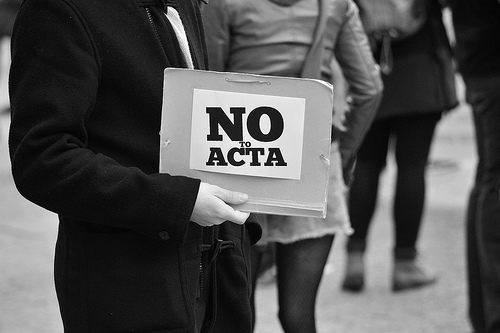Australia doesn't need ACTA: academics

There is no reason why Australia should ratify the Anti-Counterfeiting Trade Agreement (ACTA); doing so would place the country at a trade disadvantage, according to academics from Australia's universities.

(No acta image by Rog01, CC BY-SA 2.0)
In a joint select committee today in parliament, Australia's stance on the ratification of ACTA was challenged by three academics: Associate Professor Kimberlee Weatherall from the University of Sydney's Law School and Dr Matthew Rimmer from the Australian National University's (ANU's) College of Law and Dr Hazel Moir from ANU's Centre for Policy Innovation.
All three academics came to the conclusion that there was no evidence to suggest that the existing world forums that encourage cooperation on counterfeiting were not already sufficient as a means to combat counterfeiting, making ACTA redundant and otherwise bringing no benefit to the country.
"Working through the many, many existing fora that are addressing issues like counterfeiting is perfectly adequate at this point. In terms of customs cooperation, we have a world customs union that can facilitate cooperation in that field. In relation to police, we have Interpol and all sort of bilateral and multilateral mechanisms for the police to cooperate," Weatherall said.
"I've seen no real evidence or suggestion that we are having difficulty with cooperating with the parties to ACTA. Most of these parties we have agreements with."
Although Australia doesn't have the same trade agreements with Europe as it does with Singapore and the US, Weatherall said she didn't perceive that there would be any problems that would prevent cooperation and it would be extremely unlikely that Australia's refusal to ratify would result in Europe taking an uncooperative stance on trade.
"It does seem to me that we have quite a lot of fora in which we can work on cooperation in this field."
Rimmer agreed, adding that the last thing the world needed was another committee to argue over who should enforce a harmonised intellectual property standard.
"I think that the ACTA committee is an unnecessary addition to the alphabetti-spaghetti of international intellectual property law, and I don't think it helps having this endless fragmentation and multiplication of institutions who claim some sort of jurisdiction over matters of intellectual property enforcement," he said.
According to the three academics, there would be other, more dire consequences of ratifying ACTA, such as locking in Australian legislation for a significant period of time.
"You are locking in existing law, regardless of what might happen in five years, in 10 years, in 20 years," Weatherall said.
While there are many forums for Australia to cooperate and provide the flexibility for nation states to change their stances over time, Weatherall warned that Australian legislation couldn't possibly remain static for this period of time.
"The position assumes that existing Australian law is not only appropriate now for Australia, but it's appropriate for every country in the world for now and in 20 years' time, which just can't be right given the rate at which technology changes and IP law changes," she said.
Moir was in agreement, saying that Australia needed to fix its own intellectual property legislation first before it attempted to harmonise it with the rest of the world.
"I don't think we've got [intellectual property law] right. And why we should seek to harmonise a system that isn't right seems to me to be silly. Let's get it right first," she said.
"If we had a system that genuinely balanced the interests of creators and consumers, rather than simply pandering to the interests of distributors, then it might be a system worth harmonising."
Although each of the academics' strongly protested ACTA, they also appeared to realise that it may be unstoppable and argued that if their pleas were not heard, that ratification be delayed due to the timing of the issue.
"At the very least, you don't ratify now. You don't ratify while it's still in such question in the US, while it's still basically suspended in Europe because ... until countries like that have resolved their issues and think it's an international standard, well it's just not," Weatherall said.